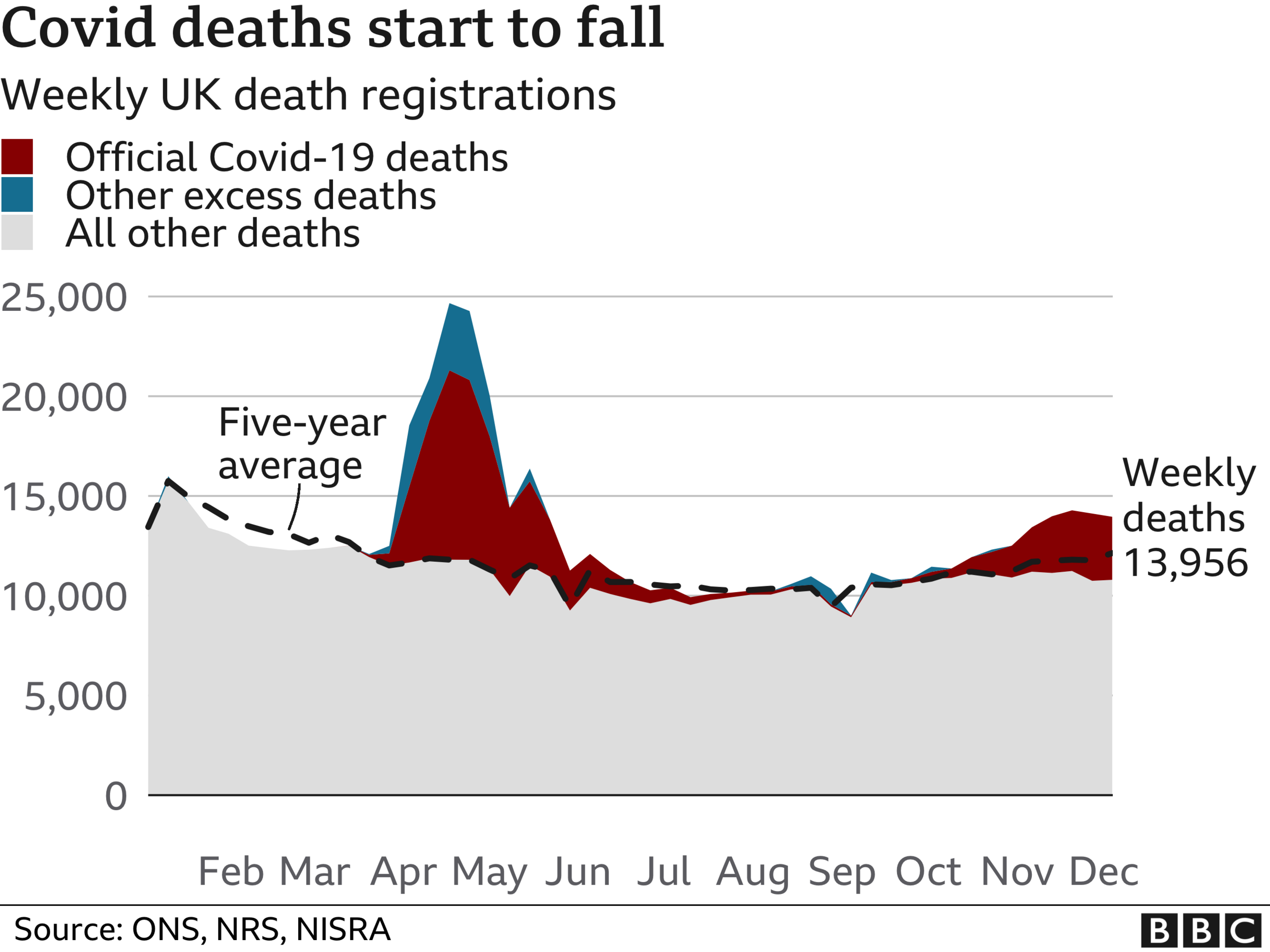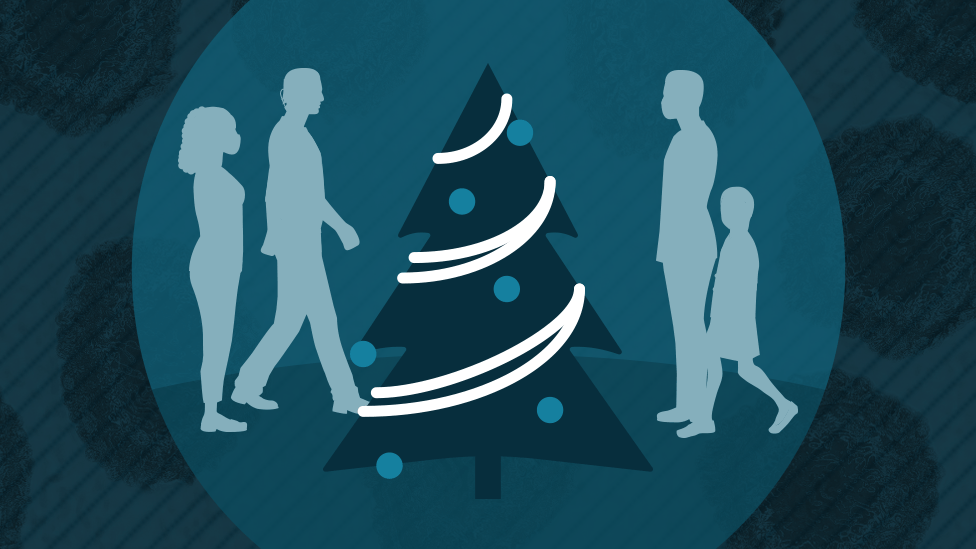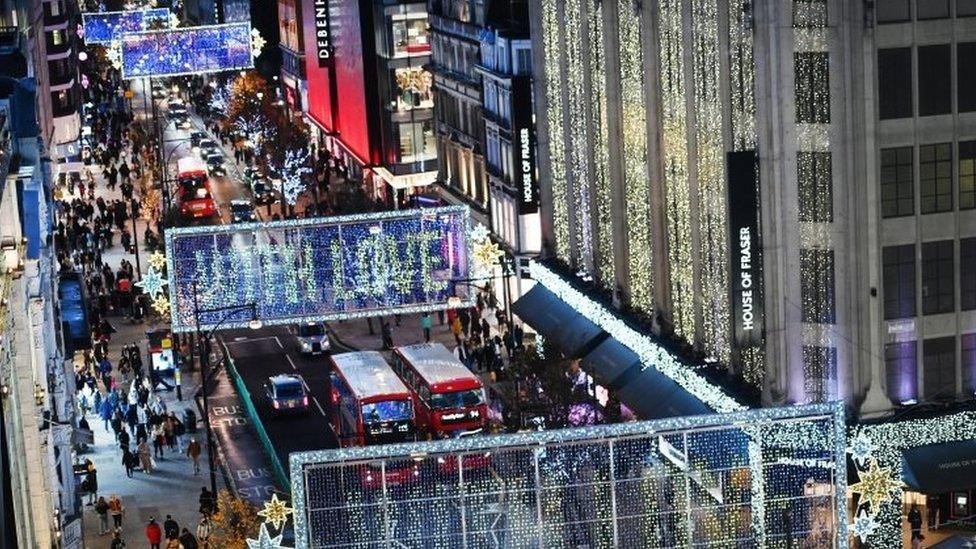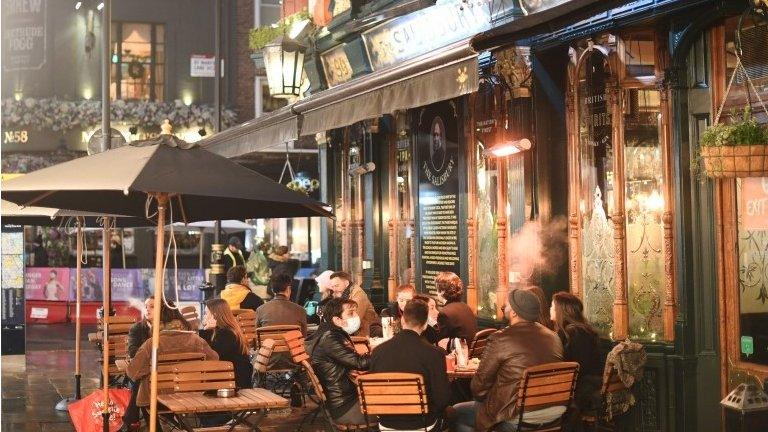Covid rules still to be relaxed over Christmas in UK
- Published
Minister Robert Jenrick says people "should use their own judgement at Christmas"
A relaxation of coronavirus rules over Christmas will still go ahead despite calls for them to be toughened, the four UK nations have agreed.
But sterner warnings will be issued to urge people to keep social contact low.
UK leaders have come under pressure to review the five-day plan as Covid infections continue to rise in Wales and parts of south-east England.
Only two households are advised to mix in Wales, under new stricter advice.
Prime Minister Boris Johnson told the House of Commons: "We should exercise extreme caution in the way we celebrate Christmas."
He said discussions on Wednesday morning had resulted in "unanimous agreement" between the four UK nations "that we should proceed in principle with the existing regulations because we don't want to criminalise people's long-made plans".
However, he added it was "absolutely vital that people should, at this very, very tricky time, exercise a high degree of personal responsibility".
He urged people to be particularly careful when they come into contact with vulnerable people - and should avoid contact with elderly people "wherever possible".
A statement is expected soon to confirm the details of Wednesday morning's talks.

What are the Christmas rules?
Between 23 and 27 December, you can form a "Christmas bubble", external comprised of people from three households
You can travel between tiers and between UK nations to meet your bubble
You can only meet in homes, places of worship or public outdoor spaces - not pubs or restaurants
You can meet people outside your bubble according to your local rules

Earlier, cabinet minister Robert Jenrick urged the public to "use their own judgement" on who to see over the five days of relaxed rules, from 23 to 27 December.
Mr Jenrick said the government "can't legislate for every eventuality" so the law which sets out the Christmas relaxations "remains unchanged".
However, Mr Jenrick told BBC Radio 4's Today programme that further guidance would be published to show infection rates are rising in many parts of the country, and to reflect that Covid cases surged in parts of the US following the Thanksgiving holiday.
An information campaign is expected to be launched in the days running up to Christmas, with people being urged to think carefully about bubbling with elderly or at-risk relatives.
Mr Jenrick said based on the further guidance, the government would ask people to "weigh up the risks to their own loved ones" and "exercise their own good judgement" about their Christmas plans.
"You can come together as three families and bubble for up to five days - but I suspect many, many people across the country will choose to do less than that, to protect themselves, their loved ones, and broader society," he said.
The government's Christmas travel adviser, Sir Peter Hendy, said ministers' message to the public would be "stay local if you can".
He told MPs on the Transport Committee he was confident there would be no overcrowding on trains during the festive period, but urged passengers to book tickets early.

Labour has called for the measures over Christmas to be reviewed.
Shadow communities secretary Steve Reed told BBC Breakfast that the four UK nations should reconsider whether the proposed easing of restrictions was safe, "given what we now know about the failure of [England's] tiered system to control the rate of infection".
It comes after two leading journals said the "rash" decision to ease restrictions would "cost many lives".
In a joint editorial, the British Medical Journal and Health Service Journal stressed that demand on the NHS was increasing, adding that a new strain of coronavirus - identified in both England and Wales - "has introduced further potential jeopardy".
Graham Medley, a member of the Scientific Advisory Group for Emergencies (Sage), said the "major driver" for how much the disease spreads over the five-day Christmas period was the infection prevalence - and that the current prevalence had started to rise "really quite rapidly in some places".
"When the rules were made about Christmas, we didn't know what that prevalence was going to be," Prof Medley told the Today programme.
As for the risk of the NHS becoming overwhelmed, he said: "We don't have much headroom."
After the first round of talks on Tuesday, a UK government source said they were "keen to maintain a UK-wide approach".
Scotland's First Minister, Nicola Sturgeon, had earlier told the Scottish Parliament there was a "case" for tightening the planned freedoms to combat a rise in infections.
In Wales, First Minister, Mark Drakeford, said "the choice is a grim one", but the current plans were a "hard-won agreement" he would not put aside "lightly".
A spokeswoman for Northern Ireland's First Minister Arlene Foster and Deputy First Minister Michelle O'Neill said they would be holding discussions with their medical and scientific advisers.


Despite the significant pressure for a rethink, leaders from the UK are likely to stick to the deal they agreed last month.
There are no plans for a change of regulations in England - and it's unlikely Wales, Northern Ireland and Scotland will make changes either.
But there are real concerns among decision makers about the impact the relaxations could have - in particular the number of people who will be travelling across the UK.
So you can expect to hear much stronger advice that just because you can mix, that doesn't mean you should.
Ministers are preparing to warn people they should limit their interactions before forming a Christmas bubble, that they should think carefully before mixing with elderly or at-risk relatives, and that where possible people should stay local and avoid travel.
Leaders are still trying to strike a balance between allowing people to visit relatives who they may not have seen for months, without allowing the virus to run rampant.
But many still believe that relaxing rules just as many areas are seeing a significant increase in cases is too risky, and will lead to a considerably more difficult period at the start of next year.

The resumption of talks comes as nearly 10.8 million people in London, and parts of Essex and Hertfordshire joined England's toughest tier of restrictions at 00:01 GMT.
It means some 34 million people in England are now living under the toughest rules - around 61% of England's population.

RESTRICTIONS LOOK-UP: The rules in your area
TESTING: How do I get a virus test?

Under tier three - very high alert - rules, pubs and restaurants must close, except for takeaway and delivery, and indoor entertainment venues such as theatres, bowling alleys and cinemas must remain shut.
Ministers are also due to review other English tiers today - with an announcement due on Thursday.
On Tuesday, the Scottish government announced that three council areas - Aberdeen, Aberdeenshire and East Lothian - are to have tougher restrictions imposed from Friday in a bid to reverse rising numbers of cases.
It was also announced that a further 506 people in the UK had died within 28 days of testing positive for Covid-19, bringing the total to 64,908. Another 18,450 infections were confirmed.

BRAND NEW THE VICAR OF DIBLEY: Geraldine returns to offer her thoughts about lockdown and social distancing
THE RACE FOR A VACCINE: The inside story of the development of the Oxford vaccine against Covid-19


How have you been affected by coronavirus? What has it meant for your Christmas plans? Share your experiences by emailing haveyoursay@bbc.co.uk, external.
Please include a contact number if you are willing to speak to a BBC journalist. You can also get in touch in the following ways:
WhatsApp: +44 7756 165803
Tweet: @BBC_HaveYourSay, external
Please read our terms & conditions and privacy policy
If you are reading this page and can't see the form you will need to visit the mobile version of the BBC website to submit your question or comment or you can email us at HaveYourSay@bbc.co.uk, external. Please include your name, age and location with any submission.
- Published23 December 2020

- Published15 December 2020

- Published15 December 2020

- Published14 December 2020

- Published1 July 2022
